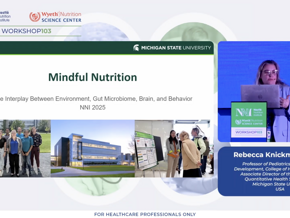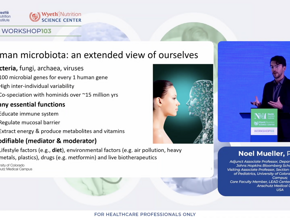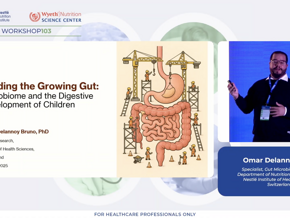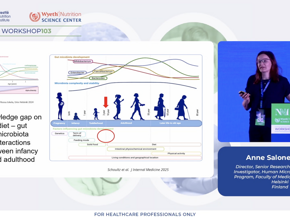The First 1000 Days In Nutrition
Nutrition Institute Africa (NNIA) Continuous Nutrition Education In Seychelles
The NNIA hosted a two-day Continuous Nutrition Education (CNE) for some 50 health care professionals in the Seychelles from 30 November to 1 December 2011, to discuss Maternal and Child Nutrition during the first 1000 days, from pregnancy to beyond the age of two, with the latest information on various aspects of early nutrition and later health outcomes. Paediatricians from Mauritius, Madagascar and Seychelles presented at the meeting and shared their expertise and experience in prenatal and postnatal issues on a regional platform.
This scientific meeting was organised in close collaboration with the Seychelles Medical Association, and its Chairman, Dr Noel, remarked in his welcome address on the importance of this type of forum in order to facilitate communication between experts in the field of nutrition. He was also highly privileged to host this first edition of the NNIA CNE in the Seychelles.
Prof Andrianasolo, NNIA Vice Chairperson, presented the ‘Significance of 60 days Preconception’ and discussed the issues faced by both developing and developed countries. He explained that most developing countries face malnutrition because of the scarcity of foods, or because populations live below the poverty line. Developed countries, on the other hand, face over-nutrition; causing obesity and other related illnesses. “The institute fosters ‘Science for Better Nutrition’ because we are convinced that innovative, science-based nutrition can help enhance the quality of people’s lives all over Africa,” added Prof Andrianasolo, who is also Chief Nutritionist at the National Institute of Public Health in Antananarivo.
Dr Seth, a Child Specialist in the Seychelles, discussed the ‘Role of Micronutrients in Pregnancy and Lactation’, focusing on the essential vitamins and minerals required during that time. She also revealed that mothers in Seychelles give birth to healthy babies in spite of limited resources.
Prof Raobijoane, Consultant Paediatrician at Befelatanana Hospital, presented some preliminary results of the breastfeeding practices in four paediatric hospitals in Antananarivo. His study showed that the rate of exclusive breastfeeding was at 45% in babies younger than six months, and at 59% in babies of six-month age. “Difficulties in breastfeeding were mostly being encountered by young (under 20 years) and illiterate Malagasy mothers,” explained Prof Raobijoane. In the same context, Mrs Mein, Nursing Ward Manager at Victoria Hospital in Seychelles, commented on the breastfeeding practices in the island. She described the ‘Maternity Unit Breastfeeding Surveillance Programme’ as a means to set a standard for breastfeeding promotion. “Breastfeeding initiation rate within the first hour of birth has significantly increased, and is now at 60% in the Seychelles,” she added.
Dr Joomye and Dr Toofanny, two paediatricians from Mauritius, presented on ‘Protein Quality in Infant Feeding and Long Term Outcomes’ and ‘Nutrition of the Preterm infant’ respectively. The forum ended on day two with panel discussions on food fortification and the regulatory framework on health claims delivered by Mrs de Beer, NNIA board member, as well as some ethical considerations when it comes to health and nutrition of infants and young children, presented by Dr Poorun, Consultant Pediatrician from Mauritius. Overall, the two-day workshop has been well appreciated by all participants; the event indeed, marked a significant milestone in the history of NNIA activities in the Indian Ocean!
If you liked this post you may also like



